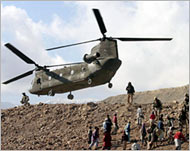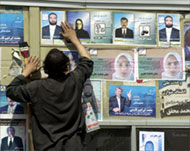US launches Afghanistan offensive
Hundreds of American marines and Afghan special forces have trekked into remote Afghan mountains to retake a valley controlled by rebels suspected of ambushing a team of US commandos and shooting down a special forces helicopter.

The major offensive in eastern Kunar province, near the border with Pakistan, is the biggest yet against those believed responsible for the twin attacks on 28 June, the deadliest blow to American forces in Afghanistan since ousting the Taliban in 2001.
Three members of a four-man Navy SEAL team were killed in the ambush, and all 16 troops on board the Chinook helicopter that was sent to rescue them died when it was hit by a rocket-propelled grenade.
Saturday’s offensive came after a deadly week for US forces in Afghanistan. Seven American soldiers have died, as well as dozens of suspected rebels and civilians, reinforcing concerns that crucial elections next month to elect lawmakers for a new legislature may be threatened by widespread violence.
Rebel base
Hundreds of Afghan rebels, as well as militants from Pakistan, Saudi Arabia and Chechnya, are thought to be hiding in Kunar’s Korengal Valley and are intent on disrupting the elections, according to US military and Afghan special forces commanders in the area.
 |
|
The US believes the rebels are |
“We want them running for their lives way up in the hills where they can’t attack polling stations,” said Captain John Moshane, of the 2nd Battalion, 3rd Marine Regiment, based in Hawaii. “We want to isolate them from the community.”
US and Afghan forces started moving into position at one end of the valley on Thursday, about 190km east of the capital Kabul. They were digging mortar and machine-gun pits for a temporary resupply base in the middle of a corn field near Kandagal, a village of about 100 farmers and their families.
The move sparked an immediate response from the rebels, who attacked a nearby US base and a convoy of troops with rockets, but they all missed.
Two week operation
American and Afghan troops started hiking into the rugged mountains on Friday and Saturday, as A-10 attack aircraft circled above. Many of the teams led lines of donkeys laden with food and water. The operation was expected to last at least two weeks, Moshane said.
 |
|
There are concerns rebels are |
One of the main objectives is breaking up a network of fighters led by a local Taliban leader, Ahmad Shah, also known as Ismail, who is believed to be responsible for the 28 June attacks, said Kirimat Tanhah, a commander in the US-trained and funded Afghan Special Forces.
Shah is suspected of having ties to al-Qaida fighters in Pakistan, he said.
“Ismail’s men ambushed the SEAL team and shot down the helicopter,” he said in an interview. “Many of them are foreigners and have trained in Pakistan and elsewhere.”
He said Shah was also paying local impoverished villagers to fight for him.
Taliban or criminals?
Lieutenant-Colonel Jim Donnellan, the commander of the marines battalion, said Shah had claimed responsibility for the
ambush of the commandos and downing the helicopter.
|
“Some of them are thugs, others are political ideologues, coming in and throwing their money around” Jim Donnellan, |
But he said there were lots of other fighters in the area, including al-Qaida members, fighters loyal to renegade former premier Gulbuddin Hekmatyar – who is wanted by the United States – and other Taliban groups, as well as criminals involved in timber and gem smuggling who are opposed to the US presence in the region.
“Some of them are thugs, others are political ideologues, coming in and throwing their money around,” he said.
“Many villagers are paid good money to work with the militants.”
Rescuer threatened
Meanwhile, a local shepherd, Sher Alam, who rescued the fourth Navy SEAL commando, the only one who survived the 28 June ambush, was in hiding after militants threatened to kill him, according to two of his fellow tribesmen.
“Men distributed leaflets around our village saying they were going to kill him,” said Shah Wali, a neighbour. “His wife and children are being protected by others in the village, but Sher had to leave.”
He said Alam was grazing his animals when he found the commando hiding in mountains after the ambush. He said the Navy SEAL pointed his gun at Alam, but the shepherd raised his shirt to show he had no weapon and was not a threat.
Alam took him to his home and bandaged his wounds, before walking to a nearby US base to ask them to come and pick
him up, Wali said.
He said Alam, who is Pashtun, the same ethnicity as the Taliban, gave sanctuary to the commando because “it is our
culture”.
“We would help anyone who asks, anyone … well, except Osama bin Laden because he damaged our country,” he added.
Donnellan, the marines commander, confirmed that the SEAL was saved and sheltered by a local villager, but he declined to elaborate.